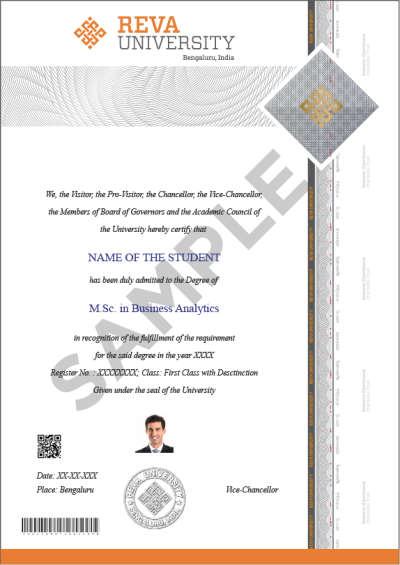India’s Top-Ranked Program
M.Sc. in
Business Analytics
Offered in Association with AWS Academy and Microsoft Azure
A comprehensive 24-month program designed exclusively for working professionals to transition into analytics and data science leadership roles.
Start Date
September 2025
Duration
2 Years
Recognition
Approved by UGC
Program Fee
INR 4.8 Lakhs
Achieve Your Career Goals
Outstanding placement outcomes for our graduates
Average Salary
Average Hike
Median Salary
Median Hike
Hiring Partners
Success Stories
See how our alumni transformed their careers
Become an Analytics Consultant
The M.Sc. in Business Analytics program participants in the two years of their tenure and beyond develop deep tri-dimensional frameworks that help them solve complex business challenges.
Domain/Business Understanding | ML/AI Applications | Data-Driven Business Problem Solving
Why Business Analytics with RACE?
Comprehensive program features designed for your success
Why Choose RACE?
Five compelling reasons to join our program
This unique program will help the learner to design data-driven processes and systems, build descriptive, diagnostic, predictive, prescriptive, and cognitive models, deploy and monitor them in a real-time business setting.
This program is designed to help enterprise leaders who can harness the web of information from internal functions and external sources into meaningful decisions, to build profitable and sustainable organizations.
A well-balanced program curriculum ensures that the learner gains deep technical and functional expertise in building Machine Learning/Deep Learning-based applications in all the enterprise functions.
At the end of this two-year program, the learners will get to work on 10+ mini-projects, 2+ full-scale projects, and research publication(s). These projects are mentored by industry thought leaders.
A wide network of 50+ industry mentors, 100+ marquee organizations as placement partners, and 1000+ strong alumni network ensure a successful transition with 50 to 200% increase in salary.
Curriculum Highlights
Comprehensive curriculum designed for industry readiness
94 Credits | 4 Semesters | 17 Modules | 10+ Mini Projects | 2 Capstone Projects with Industry Mentorship | 2+1 Global Certifications | 1 Research Paper Publication
Module 1:
Management Essentials for Analytics (4)
Learn essentials of management; planning, organizing, directing and controlling in a real-time simulated environment through case studies. In this course, the learners will hone their decision-making skills by enacting the protagonists’ role in solving challenging managerial situations. The learners will debate and participate in designing the strategies and implementing tactics to build performance-driven, sustainable organizations. The focus would be to learn the skills to build a data-driven culture to manage performance and competitive advantage.
Tools: Power BI, HBR Case studies, and Simulations.
Module 2:
Data Management and Visual Analytics (4)
This module will provide hands-on skills with SQL, Python and Tableau required to implement business analytics projects. Through a set of mini-projects, the learners will design and implement a domain-driven system; design and build DataMarts with SQL, extract and process the data with Python and build a dynamic dashboard with Tableau/Qlik Sense on key performance metrics.
Tools: SQL, Python, and Power BI.
Module 3:
Applied Statistics for Business (4)
This module aims to provide a strong foundation in applying statistical concepts and methods in real-world situations and domains related to analytics. They will learn univariate, bivariate and multivariate statistical techniques, setting and testing hypotheses, sampling, probability and building statistical models. The participants will learn to present their cases with appropriate business relevance to non-statistical / business stakeholders.
Tools: Python, R, and Advanced Excel.
Module 4:
Machine Learning (4)
This module is a combination of concepts, tools and practical workshops to familiarize and build expertise in Machine Learning algorithms and model building processes. Learners will get in-depth practical skills in building supervised and unsupervised algorithms through industry-relevant case studies and data sets. CRISP-DM framework is used for all the data science projects and sessions, to ensure that the focus business solutions and not mere model building.
Tools: Python, R, Keras, H2O
Module 5
Deep Learning (4)
The objective of this module is to make the participants implement and apply state-of-the-art deep learning models in real-world problems. The participants will get in-depth understanding and hands-on exposure to applying deep learning methods to solve a variety of computer vision-based problems. The labs include building a deep neural network for a given problem, hyper-parameter tuning, and optimization to make sure it avoids overfitting, building a time sequence-based neural networks and solving the problems of forecasting, building CNN for image processing tasks, learn how and when to use Autoencoders and familiarize with the latest advances in deep learning.
Tools: Python
Module 6:
Marketing and Retail Analytics (4)
Marketing analytics helps the participants to understand and apply the processes and technologies that enable marketers to evaluate the success and value of their marketing initiatives, identify trends and patterns over time, and make data-driven decisions. They will be able to apply marketing mix modelling, market basket analysis, Association rules, Customer Lifetime value calculations and recommendation engines.
Tools: Python, R, Azure, and Power BI.
Module 7:
Financial Analytics (4)
This course deals with financial analytics concepts and its applications in real-life business environments. Concepts in Fundamental and Technical analysis, Key Financial Statements, Computation of Key Financial Metrics, Types of BFSI Products, and Profit and Loss Drivers etc., will be learnt. The learners will be able to design, build and deploy machine-learning models in BFSI segments. Algorithmic trading, Credit risk scoring, fraud analytics, portfolio management are some of the use cases.
Tools: Python, R, Azure, and Power BI.
Module 8:
Supply Chain Analytics (4)
Learn the best practices on supply chain analytics from global practitioners. The module provides conceptual and practical skills on the complete spectrum of supply chain and analytics applications on; operational procurement, vendor management, procurement decisions, category management, spend analytics, production systems, logistics sales & operations and customer management. At the end of the module, the learners will be able to design streamlined processes, demand forecasting, network design, predictive maintenance, warehouse zoning and management, performance reports, decision dashboards, moving from descriptive to predictive to prescriptive analytics through real-time industry case studies.
Tools: Python, Advanced Excel, HBR case studies, simulations and role-plays.
Module 9:
Natural Language Processing (4)
The objective of this course is to provide knowledge and skills to the participants to analyze the text and derive useful insights. The participants will be able to read the text data, preprocess, and classify the text. They will have a clear understanding of grouping the text/documents by similarity, detecting the topics in texts, analyze the sentiments, topics and intent with social media posts. NLP based models will be taught with hands-on sessions.
Tools: Python, R
Module 10:
Generative AI Applications (4)
This course will delve into the transformative power of Generative AI, exploring its applications across various industries. Through practical projects, participants will gain hands-on experience with cutting-edge tools and techniques for leveraging AI to generate text, images, audio, and more. The objective is to empower the learner with the knowledge and skills to strategize, implement, and manage Generative AI initiatives within their organizations. Upon completion, participants will be equipped to understand the potential of Generative AI and implement relevant use cases to drive innovation.
Tools: Python, Azure, and AWS.
Module 11:
Capstone Project I (12)
The first-year Business Analytics program will culminate in designing, preparing and presenting a real-time capstone project on a live business challenge. Each of the participants will be provided with a senior industry mentor for guidance spanning 6 weeks. The final certification is strictly based on the successful completion and submission of the capstone project with a favorable assessment from the panel of industry mentors. The objective is to develop your managerial and consulting capabilities by applying the lessons learnt in the program to real-life business situations.
Tools: Full-stack
Module 12:
Consulting in Analytics (5)
Through this course, the participants will learn a variety of structured problem-solving techniques and key management frameworks to solve any business problems. Furthermore, emphasis will be on how to take complex business problems and structurally break down the problem into analytical solutions and present recommendations in the storytelling format to convince stakeholders, combine management consulting skills with statistical and data science skills to solve real-world business problems.
Tools: Simulations, HBR/IVY case studies
Module 13:
Enterprise Analytics (5)
Through this course, the participants will learn to connect large Analytics/AI systems from various functions of an enterprise and build a performance-driven KPI setting per function and enterprise as a whole. They will learn to build analytical data mart, dashboards and predictive models across key functions like Finance, Operations, Marketing and Sales, HR, Supply Chain, etc. The participant will be equipped with knowledge, skill and experience to take up the identification of opportunities for analytics in an enterprise and recommend the appropriate solution. Writing and presenting techno-functional RFP’s is an outcome of this module.
Tools: Qlik Sense, SQL, Azure, Python
Module 14:
Microsoft Certified Azure AI Engineer AI-102 (5)
This is a Microsoft Azure-based module with certification. The learners will be able to design and deploy AI systems with Azure through this course. They will plan and manage an azure cognitive services solution, implement computer vision solutions, NLP solutions, knowledge solutions, and conversational AI solutions. After completing the certification exam they will be designated as Azure AI Engineer Associate
Tools: Azure and Python.
Module 15:
Microsoft Certified Azure Data Scientist Associate DP-100 (5)
This module deals with designing and implementing a data science solution on Microsoft Azure. The participants will learn to create and manage Azure and Data Bricks workspace, run and monitor models, automated MLs and tune hyper-parameters and Deploy and operationalize machine-learning solutions in the Azure cloud environment. The participants will go through the DP-100 to qualify as Microsoft certified Azure Data Scientist.
Tools: Azure and Python.
Module 16:
Capstone Project II (12)
The second-year Business Analytics program will culminate in designing, preparing and presenting/publishing a real-time capstone project on a live business challenge. The scope and business applications of the project need to be larger than the first-year project. Designing and implementing, deploying and demonstrating an end-to-end analytics project with a reasonable monetary benefit need to be built. The program office will support with mentoring and report writing. The evaluation is based on viva-voce by an industry panel of experts.
Tools: Full Stack
Module 17:
Capstone project – Publication (10)
This module will provide hands-on skills with SQL, Python and Tableau required to implement business analytics projects. Through a set of mini-projects, the learners will design and implement a domain-driven system; design and build DataMarts with SQL, extract and process the data with Python and build a dynamic dashboard with Tableau/Qlik Sense on key performance metrics.
Tools: SQL, Python, and Power BI.
Industry Partners
Strategic partnerships with leading technology companies


What Our Students Say
Don’t just take our word for it. Here’s what real students say about their RACE experience.
Board of Studies Members & Mentors
Learn from industry thought leaders and experienced professionals who guide our curriculum and mentor our students

Dr. J B Simha
Dr. J.B. Simha has designed and deployed analytical systems across BFSI, Telecom, Healthcare, and Manufacturing. He has (more…)

Ratnakar Pandey
AI & Data Science Leader with 15+ years of experience across Tech, BFSI, FinTech, and Retail in the US & India. Led 50+ professionals and delivered high-impact (more…)

Pradeepta Mishra
Pradeepta Mishra is a seasoned AI leader with 20+ years of experience in applied AI, deep learning, and data science. (more…)

Ravi Shukla
Senior Data Scientist at Dell with 15+ years of experience and 35+ patents filed, recognized among Dell’s top patent filers (more…)

Shriram Vasudevan
Shriram Vasudevan (FIE, FIETE, SMIEEE) is a multifaceted AI Engineering Leader with over 17 years of experience spanning industry, R&D, and academia. A TEDx (more…)

Bismillah Kani
Innovative AI leader with 15+ years of experience delivering enterprise-scale AI solutions across aerospace, (more…)

Dr. Angshuman Ghosh
Dr. Angshuman Ghosh is the Founder & CEO of MENRV.AI, Menrva Technologies, and Menrva Enterprises, building impactful AI-ML products for global (more…)

Prahalad Karnam
An alumnus of Columbia and Harvard Business Schools with 25+ years of global experience in strategy, marketing, and consulting. Has worked with top brands (more…)

Akshay Kulkarni
Akshay is a globally recognized AI and ML evangelist, author, speaker, and mentor. As the Global Head of AI & GenAI (more…)

Usha Rengaraju
Usha is the world’s first woman Triple Kaggle Grandmaster, AI consultant, and trainer with 10+ years of experience. She’s (more…)

Sayandeb Banerjee
Co-founder and CEO of MathCo, member of the Forbes Tech Council and AIM Council. Leads strategy, innovation, and people-centric initiatives to drive (more…)

Amaralingeswara Rao Kaka
Leads EDB’s APJ Professional Services, driving efficient, cost-effective migrations through the India-based Migration (more…)

Yuvaraju Maddiboina
Experienced Data Scientist with expertise in Python, Machine Learning, and Data Science, with a background in manufacturing. Holds an M.Tech in (more…)

Abinash Padhi
Data Science professional with 10+ years of experience across domains like automotive, retail, pricing, marketing, and (more…)

Dr. Santosh Nair
Dr. Santosh Nair is an expert in statistical modeling and advanced analytics, with specialization in marketing mix modeling, (more…)

Dr. Sai Hareesh
Dr. Sai Hareesh has 14+ years of experience in AI, Computer Vision, and Deep Learning across defense, (more…)
Globally Recognized Certification
Earn a prestigious M.Sc. degree from UGC-approved REVA University along with industry certifications
Additional Certifications Included:
- Microsoft Certified Azure AI Engineer AI-102
- Microsoft Certified Azure Data Scientist Associate DP-100
- AWS Academy Certifications

Your Analytics Career Starts Here
Don’t let another day pass wondering “what if”. Take action now and transform your career forever.
I am text block. Click edit button to change this text. Lorem ipsum dolor sit amet, consectetur adipiscing elit. Ut elit tellus, luctus nec ullamcorper mattis, pulvinar dapibus leo.
₹4,60,000
₹4,80,000 Early Bird Price
Save ₹20,000 Today!
🔒 Secure Payment • 💰 Money-Back Guarantee • 📞 24/7 Support
What Our Students Say
Don’t just take our word for it. Here’s what real students say about their RACE experience.
Saturdays: 9:15 AM to 5:00 PM
Program Contents
Three major components: CISSP Toolkit + ISO27001 + Data Privacy
Key Features:
- ✔️ 100-day Project Plan for working professionals
- ✔️ Access to well-structured LMS with CISSP Videos
- ✔️ Weekly Live Classes covering all 8 domains
- ✔️ Inbuilt smart study guide with daily bytes
- ✔️ Mobile App flexibility for learning on-the-go
Module 1: Security and Risk Management
- Security governance principles
- Compliance requirements
- Risk management concepts
- Threat modelling
- Business continuity
Module 2: Asset Security
- Information and asset classification
- Ownership (data owners, system owners)
- Data security controls
- Handling requirements
Module 3: Security Architecture and Engineering
- Engineering processes using secure design
- Security models and concepts
- Security capabilities of information systems
- Physical security
Module 4: Communication and Network Security
- Secure network architecture design
- Secure network components
- Secure communication channels
- Network attacks
Module 5: Identity and Access Management (IAM)
- Physical and logical access control
- Identification and authentication techniques
- Identity management implementation
- Access monitoring and auditing
Module 6: Security Assessment and Testing
- Design and validate assessment strategies
- Security control testing
- Collect security process data
- Analyze test outputs
Module 7: Security Operations
- Investigations support and requirements
- Logging and monitoring activities
- Security operations and administration
- Disaster recovery planning
Module 8: Software Development Security
- Security in the software development lifecycle
- Development environment security controls
- Software security effectiveness
- Secure coding guidelines
Module 1: Introduction
- Overview of ISO27001
- Understanding ISMS
- Risk Assessment and Management
- Gap Analysis
Module 2: Security Controls and Procedures
- Controls Selection and Implementation
- Security Policies and Procedures
- Security Awareness & Training
- Incident Response and Business Planning
Module 3: Auditing and Compliance
- Internal Audits
- Certification Process
- Legal and Regulatory Compliance
- Implementation of Controls and Testing
Module 4: Incident Response Management
- Security Incident Management
- Finalizing and Documenting the ISMS
- Evaluation and Improvement
Module 5: Case Studies
- Gap analysis workshops
- Information security policy development
- Risk assessment exercise
- Incident response planning
Module 6: Practical and Labs
- User Access management
- Network Security
- Data Classification
- Mini Project implementation
Module 1: Introduction to Data Privacy
- Overview of Data Privacy
- Key concepts: Personal data, sensitive data
- Global Data Privacy Landscape: GDPR, CCPA, HIPAA
Module 2: Digital Personal Data Protection (DPDP) Law
- Introduction to DPDP
- Key Provisions and data protection principles
- Rights of data subjects
- Compliance Requirements and penalties
Module 3: Data Privacy Governance
- Establishing a Data Privacy Program
- Privacy policies and procedures
- Data governance frameworks
- Building privacy-aware culture
Module 4: Data Classification and Handling
- Data Classification schemes
- Data encryption and anonymization
- Secure data storage & transfer
Module 5: Privacy Impact Assessments (PIAs)
- Conducting PIAs
- Identifying and mitigating privacy risks
- PIA tools and templates
- Continuous monitoring
Module 6: Data Subject Rights and Consent
- Right to access, rectification, erasure
- Handling data subject requests
- Consent Management
- Transparency and informed consent
Module 7: Data Breach Response
- Data Breach Prevention
- Identifying vulnerabilities and threats
- Incident Response planning
- Notification and remediation procedures
Module 8: Compliance and Technology
- Compliance Strategies
- Internal and external audits
- Impact of AI, IoT, and blockchain
- Future Trends in Data Privacy
CISSP – The Gold Standard for Cybersecurity Professionals
The Certified Information Systems Security Professional (CISSP) certification is a prestigious credential for seasoned IT professionals looking to showcase their expertise in designing, implementing, and managing enterprise-level cybersecurity programs.
Program Mentors
Learn from industry-leading professionals with real-world expertise






Who Can Participate?
Any IT professionals aspiring to lead information security and cyber security practices can apply.
CISSP Certification Requirements:
ISC2 mandates that candidates must have a minimum of five years of cumulative, full-time experience in two or more of the eight domains of the current CISSP Exam Outline.
- Post-secondary degree may satisfy up to one year of required experience
- Additional ISC2 approved credentials may satisfy up to one year
- Part-time work and internships may count towards experience requirement
- ✅ In-Depth Learning: Gain deep understanding of essential IT security areas
- ✅ Expert Guidance: Learn from industry-leading professionals
- ✅ Exam Success: Training methodology geared towards CISSP exam success
- ✅ Practical Application: Apply core IT security concepts effectively



















